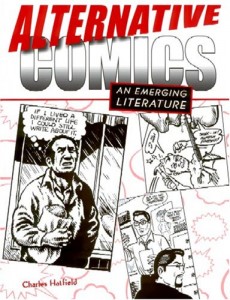
Last week several HU stalwarts and guests put a great deal of energy into their analysis of, and conversations around, my book Alternative Comics: An Emerging Literature (2005). I want to thank everyone for weighing in and taking on the work. I’m gratified by your sustained attention to Alternative Comics, even in those instances where you took issue with it. It’s great to see that the book can inspire such intense discussion, and, man, have I learned a lot from the spirited back-and-forth.
Tomorrow I plan to post in response to our exchanges on Gilbert Hernandez. And, in the weeks ahead, I hope to respond at length to Caro’s excellent and important post (from my POV the most thought-provoking of all, and one that will definitely inform my work, going forward). In today’s post, though, with your indulgence, I’d like to offer something different from a point by point reply or analysis. I’d like instead to give a personal afterword to the book, an autobiographical and critical reflection that will (a) sketch out the book’s history and context, and (b) consider the prospects for its future reception and use. I want to do this because the circumstances that drove me to write Alternative Comics have changed so very much since—not just on a personal level, but within the comics studies field—and because I want to show how a project like this fits into a working and teaching life, one that, inevitably, presses onward after the project is done.
Along the way, I’ll consider whether “alternative comics” even continue to exist in the same form as they did when I began the book, and whether the terms used to organize my thinking in the book can remain relevant.
I don’t presume that my circumstances are (or were) typical, since I’m a slow writer and Alternative Comics took a long time to get out the gate, but, given last’s week discussion and the changes fast overtaking comics and comics studies, I’d like to share with readers how the work emerged, under what pressures, and why. I hope this will go some way toward demystifying the processes that result in books like mine.
Continue reading →


